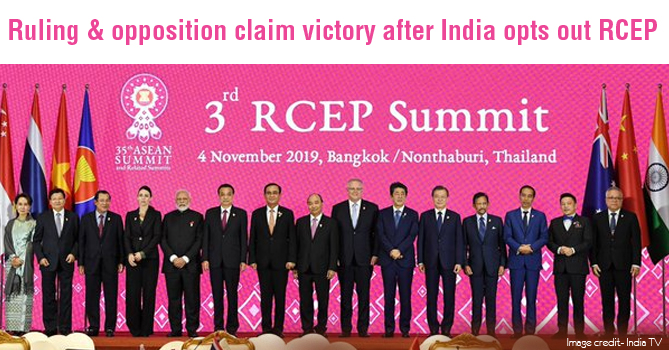
India has decided on Monday that it would not join China-backed Regional Comprehensive Economic Partnership (RCEP), which was considered to be the world’s most significant free trade pact of 16 nations. Why did India pull out at the last minute?
India not to join RCEP
However, India withdrew at the last minute because its core issues were not addressed during the negotiations. The other worry was that if the deal was signed, then inferior quality Chinese goods would be flooded in the Indian markets. The effect of Chinese goods in the Indian markets may be a significant blow of the country’s domestic industries, especially the small and medium scale sectors. The timing of the deal was also not conducive, seeing the slowdown of the economy, rampant unemployment and deep agrarian crisis. With the withdrawal of India the 15 remaining countries are planning to ink on the deal next year.
Dearth of basic spirit
In his address, Prime Minister Narendra Modi said the present form of the RCEP Agreement “does not fully reflect the basic spirit and the agreed guiding principles” or India’s concerns.
No positive answer in the deal
Modi further said “When I measure the RCEP Agreement with respect to the interests of all Indians, I do not get a positive answer. Therefore, neither the Talisman of Gandhiji nor my conscience permits me to join the RCEP”.
Sigh of relief
In fact, several worried sectors, especially the dairy industry, must have taken a sigh of relief after the government’s decision not to sign on RCEP. Dairy players from New Zealand and Australia were almost ready to venture into India markets. Worried Indian dairy industry had shown lots of concern. Hundreds of women from Gujarat associated with the dairy industry had requested the Prime Minister to exempt this industry from RCEP agreement.
Late Diwali gift
Unfortunately country never comes first in the mind of politicians, most of them want to take political mileage over any issue to get an advantage during the time of the election. Ruling and opposition both factions are busy to take the credit of India’s decision not to join the Regional Comprehensive Economic Partnership (RCEP). The Congress has been claiming that its forceful opposition had forced the BJP government to withdraw from this negotiation. Its a late Diwali gift to farmers, dairy producers, fishermen and small-medium businessmen and so on.
Forceful opposition stops govt
Congress chief spokesperson Randeep Surjewala said it is a win for all those protecting national interests. “A forceful opposition by Congress and Rahul Gandhi ensures that BJP government backs down from bartering the interests of farmers, dairy producers, fishermen, small and medium businesses at the altar of political expediency. A victory for all fighting for protecting national interests,” he said on Twitter.
Unresolved issues
Meanwhile, The External Affairs Ministry said India decided not to join RCEP because of unresolved issues and believes that under current circumstances, it would not be proper to join the RCEP. The decision was taken considering national interests, the Ministry said.
Three demands
India had three demands, but other nations could not come on one platform to agree with India. First claim of India was the base year of tariff cuts from 2014 to 2019. Of late India has increased custom duties on several goods. Another aim of India was to protect the domestic industry. It proposes an auto-trigger mechanism to check the import surge from China. India demanded strict rules to prevent China from dumping its sub-standard goods to RCEP member countries
Doors open
However, all doors have not closed for India as RCEP members are very much eager to sort out India’s issues. Australian Prime Minister Scott Morrison said on Monday that the RCEP deal would be bigger and better with India in it.
Experts believe India has chance to join the RCEP in future if its concerns regarding dumping of Chinese goods and other issues would be resolved.





